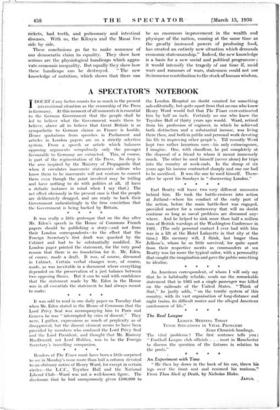A SPECTATOR'S NOTEBOOK
IDOUBT if any factor counts for so much in the present international situation as the censorship of the Press. in Germany. At this moment of all moments it is essential to the German Government that the people shall be led to believe what the Government wants 'them to believe, above all to believe that Great Britain is as sympathetic to German claims as France is hostile. Hence quotations from speeches in Parliament and articles in London papers arc on a strictly selective system. From a speech or article which balances opposing arguments scrupulously only the passages favourable to Germany are extracted. This, of course, is part of the regimentation of the Press. So deep is the awe inspired by the Ministry of Propaganda that when it circulates inaccurate statements editors who know them to be inaccurate will not venture to correct them even though the point involved may be trifling and have nothing to do with politics at all. (I have a definite instance in mind when I say that.) The net effect obviously in the present case is that the people are deliberately drugged, and are ready to back their Government unhesitatingly in the firm conviction that the Government is being backed by Britain.
It was really a little grotesque that on the day after Mr. Eden's speech in the House of Commons French papers should be publishing a story—and not from their London correspondents—to the effect that the Foreign Secretary's first draft was quashed by the Cabinet and had to be substantially modified. No London paper printed the statement, for the very good reason that there is no foundation for it. Mr. Eden,. of course, made a draft. It was, of course, discussed in Cabinet. Certain verbal changes were, of course, made, as was inevitable in a document where everything depended on the preservation of a just balance between two opposing theses. But it can be said with confidence that. the statement made by Mr. Eden in the House was in all essentials the statement he had always meant to make.
. It was odd to read in one daily paper on Tuesday that when Mr. Eden stated in the House of Commons that the Lord Privy Seal was accompanying him to Paris and Geneva he was " interrupted by cries of dissent." They were, I gather, expressions as much of perplexity as of disapproval, but the dissent element seems to have been provided by members who confused the Lord Privy Seal and the Lord President, and thought that Mr. Ramsay MacDonald, not Lord Halifax, was to be the Foreign Secretary's travelling companion.
Readers of The Times must have been a little surprised. to see in Monday's issue more than half a column devoted to an obituary notice of Henry Ward, for except in certain circles—the L.C.C., Toynbee Hall and the National Liberal Club—Ward was not a well-known figure. The disclosure that he had anonymously given £100,000 to the London Hospital no doubt counted for something sub-editorially, but quite apart from that.no one who knew- Henry Ward would feel that The Times over-estimated him by half an inch. Certainly no one who knew the Toynbee Hall of thirty years ago would. Ward, retired from his profession of engineer, in which he achieved both distinction and a substantial income, was living there then, and both in public and personal work devoting his life to improving other people's. Till recently Ward kept two rather luxurious cars—his only extravagance, I imagine. One, with chauffeur, he put completely at the disposal of a friend to whom it meant immensely much. The other he used himself (never alone) for trips into the country at week-ends. In the slump of six years ago his income contracted sharply and one car had to be sacrificed. It was the one he used himself. There- after he spent his Sundays in " discovering London."
Earl Beatty will leave two very different memories behind him. He took the battle-cruisers into action at Jutland—where his conduct of the early part of the action, before the main battle-fleet was engaged, provided matter for a controversy that will no doubt continue so long as naval problems are discussed any- where. And he helped to sink more than half a million tons of British warships at the Washington Conference in. 1921. (The only personal contact I ever had with him was in a lift at the Hotel Lafayette in that city at the time.) His memory will, I think, last longer than Jellicoe's, whom he so little survived,' for quite apart from their respective merits as commanders at sea Beatty was far more the typical sailor, with a personality that caught the imagination and gave the public something to idealise.
An American correspondent, of whom I will only say. that he is habitually reliable, sends me the remarkable statement that in 1935 not a single passenger was killed on the railroads of the United States. " Think of that," he justly adds, " on the terrific system of this country, with its vast organisation of long-distance and, night trains, its difficult routes and the alleged American carelessness of life."
* The Real League
LEAGUE MEETING TODAY TENSE SITUATIONS IN VITAL PROBLEMS
News Chronicle headings. The vital problems ? The first sentence tells you : " Football League club officials . . . meet in Manchester to discuss the question of the fixtures in relation to the pools."
An Experiment with Time " He then lay down in the back of his car, threw his legs over the front seat and resumed his mafiana.". From Thou Shell of- Death, by Nicholas Blake.
Itxus.














































 Previous page
Previous page